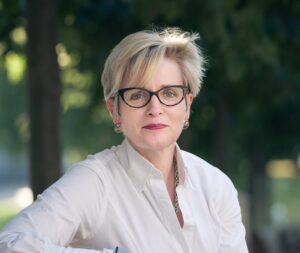With this post we begin a new series of perspectives from some of publishing’s leaders across the non-profit and for-profit sectors of our industry. How did these leaders get into publishing? What excites them? What is their vision for the future of publishing, and indeed for the business and careers of all those working at their organization? We rarely gain these insights, so we are excited to give voice to some of the key leaders in the academic publishing world.
Today, Robert Harington talks to Mandy Hill, Managing Director of Academic Publishing at Cambridge University Press (CUP). Mandy is responsible for CUP’s worldwide academic book and journal publishing portfolio. She is a member of the Press Board, and of the Academic Publishing Committee of the Press Syndicate.
 What was your route into publishing? Could you tell our readers a little about what drives you as a leader of CUP?
What was your route into publishing? Could you tell our readers a little about what drives you as a leader of CUP?
I found my way into publishing really through looking at what roles would use my biochemistry degree but didn’t need a PhD. I looked at a number of options but landed on academic publishing in a production role at Pergamon Press (Elsevier). Six years at Elsevier provided a great foundation for me. After that, I had nearly 16 wonderful years at Oxford University Press largely in journals editorial and latterly also managing books editorial teams. And for the past 8 years I have been at Cambridge as Managing Director for Academic publishing.
Whilst I didn’t come into publishing with a clear plan, I quickly became passionate about what we do and the impact we can have to spread knowledge, spark curiosity, and aid understanding around the world. And that passion continues to drive me. I want to keep on improving what we do and how we do it to better serve our customers, authors, and partners. Being at Cambridge, for me, is the perfect blend of an ambitious, innovative environment where we are also still able to care about the fundamentals of great publishing, surrounded by interesting and engaging colleagues.
As a leader in academic publishing, what most excites you right now?
I feel very lucky to be in academic publishing at this moment, and especially at a global university press. We are going through so much change that this creates huge opportunities for us to differentiate ourselves and make an impact, even though we are significantly smaller than many of the large commercial publishers.
The biggest things that are motivating me at present are:
- Delivering on our roadmap to open access (OA) transformation for research publishing. It is especially important for us to make this transition work across subject areas (so that Humanities and Social Sciences doesn’t get left behind, or be expected to fit into Science, Technology and Medicine-designed models) and for monographs too (a longer-term challenge);
- Really transforming our ‘textbook’ program to support instructors to make the most of digital and adaptive technologies and improve learning outcomes. The quality of our textbooks, our platform and the recent acquisition of CogBooks, the online adaptive learning platform (and actually not being a historically large textbook publisher) give us real opportunities to create new solutions;
- Achieving a real change in diversity and inclusion both in our workplaces and in our products;
- Reducing our carbon footprint.
How is CUP positioned to serve the next generation of students, researchers and professionals?
As a department of the University of Cambridge, we are able to take a slightly longer-term view. This means that we don’t have to be wedded to what we have always done, but think about what our customers really need.
There is much about what publishers have always done that remains important. Our customers can access all kinds of information through the internet – what they want from us is easy access to content they can trust that helps them solve their problems whether they are in research or education. At Cambridge, we remain committed to high quality products, content and services to address this need.
For researchers, our primary focus for change is the open access transformation for our journals program, but I don’t expect it to stop there. There is a need for more disruptive publishing models if we are to truly serve future generations of researchers. We have started on this path with new journal concepts, for example Research Directions which has broken away from traditional journal publishing models.
In education, we think the best learning outcomes will be achieved by supporting instructors. Our acquisition of CogBooks means that we are developing a range of products, from textbooks with increasing online functionality through to adaptive courseware. We are working with institutions to use this combination to best meet their future needs.
What do you anticipate the major challenges will be for CUP, and indeed the publishing industry, over the next five years?
Most of the things that excite me can also keep me up at night.
- Major change is needed in our products and models in both research and education. If we don’t change fast enough and work in tandem with the communities we serve, we will become irrelevant in some areas. I actually think the risk here is greatest in the educational market where I feel there is less inertia. There is also risk in the research market if we were to ignore the need for a major OA transformation. We need to develop this range of new products and services at prices that are affordable to already very stretched budgets. I think this can be done, especially when we take off ‘old hats’ and come at the problems using our expertise rather than starting from a position of what we want to retain. But there is no denying that the financial challenges are real, especially for publishers of our size and smaller – there may be money for open access but it is often in all of the wrong places and of course costs are sky-rocketing at present.
- We have to attract a broader range of talent into our industry – this is a huge challenge for us all so we are much better working together to find solutions. Similarly, we need to radically improve the carbon footprint of publishing and again this is a challenge best tackled together.
- Without good quality publishers in place, our communities will be subject to so much mis-information – the rise of papermills potential for AI generated content (such as with Chat GPT) are reasons why we need to be vigilant.
What does OA mean for your business?
Open Access is a way for us to support authors increase the impact of their research. OA is central to Cambridge fulfilling our mission, allowing us to contribute to society through the pursuit of education, learning and research at the highest international levels of excellence. We use this guiding light to help us navigate and prioritize our way through the clear operational and financial challenges that OA also creates.
OA is the right end point for research and the sooner we get there the better, but in making this transition we mustn’t lose what’s important in the publishing services that we provide.
What publishing innovations are you most proud of?
My Cambridge colleagues are constantly creating new products and ideas and ways of working that fill me with pride and joy. It is hard to pick a small selection from the time I have been here, but will start with the Elements series which was a new concept bringing together the best of books and journals formats. We are approaching 1000 Elements published, many of which have had brilliant usage, citations, and social media coverage, demonstrating the impact of this new format.
I got very excited at the end of last year by the launches of Research Directions and Cambridge Prisms, two new journal series that are taking new approaches and are set to really deliver on interdisciplinarity, something that as an industry we have been grappling with for decades.
Having our own platforms (Cambridge Core and Cambridge Open Engage) has been critical for enabling these developments.
Thinking more broadly about developments that have made me proud, our Evidence Based Acquisition models for books and the success with Transformative Agreements are highlights.
But I often get just as excited by smaller innovations, whether that is in digital marketing approaches driving up our online sales, new approaches and ways of working that are increasing the diversity of our publishing, for example the wonderful work on our Shakespeare list, and let’s not forget the operational innovations that often make all of this possible.
And the final innovation I will flag is the development of Cambridge Advance Online, a series of short courses we have developed with and for the University.
What is the future of hybrid/remote working at CUP?
We are committed to hybrid working. We have said that we would like to see most colleagues in a couple of days a week on average. There is huge flexibility within this. But overall, we think that getting people together in the office on a regular basis is important for the culture and well-being of the organization and colleagues. We also know that retaining the more equitable working practices established during lockdown is critical. As in most things we need to find the right balance and try to keep and share best practices where they emerge.
What do the next generation of academic publishing jobs look like to you?
There will be iterations of most existing roles and helping colleagues to develop new skills is upper most on my mind. But there will also be new (or increased numbers of) roles for example in data science and adaptive technologies – and most people will need to be conversant in these areas.
Discussion
3 Thoughts on "Chefs de Cuisine: Perspectives from Publishing’s Top Table — Mandy Hill"
An insightful interview Robert. Thank you.
As Mandy Hill made reference to “disruptive publishing models”, I thought of the increasing role that social media has begun to play re the promulgation of academic material.
Would you say that this is a medium of publishing that university presses seem inclined to endorse?
Thanks for your comment Alfrena. Personally I wouldn’t see social media as publishing outlets (but could be provided wrong over time), but as you say it can really help to disseminate academic publishing and raise it’s profile, sometimes to unexpected audiences. Anything that can help our peer reviewed, informed content reach more people has to be a good things at of so much mis-information
Thanks Mandy.
I appreciate your comment.



